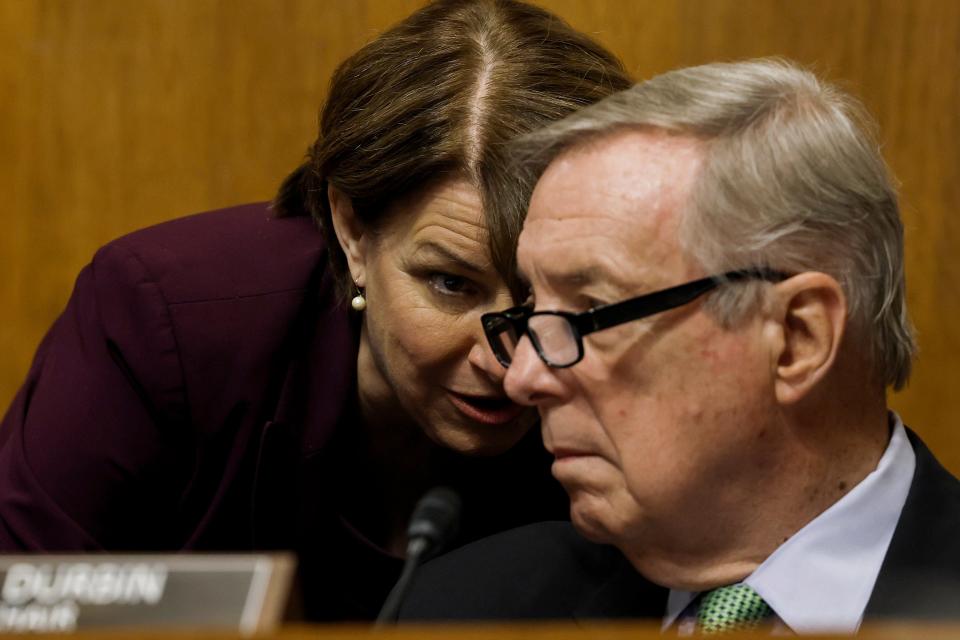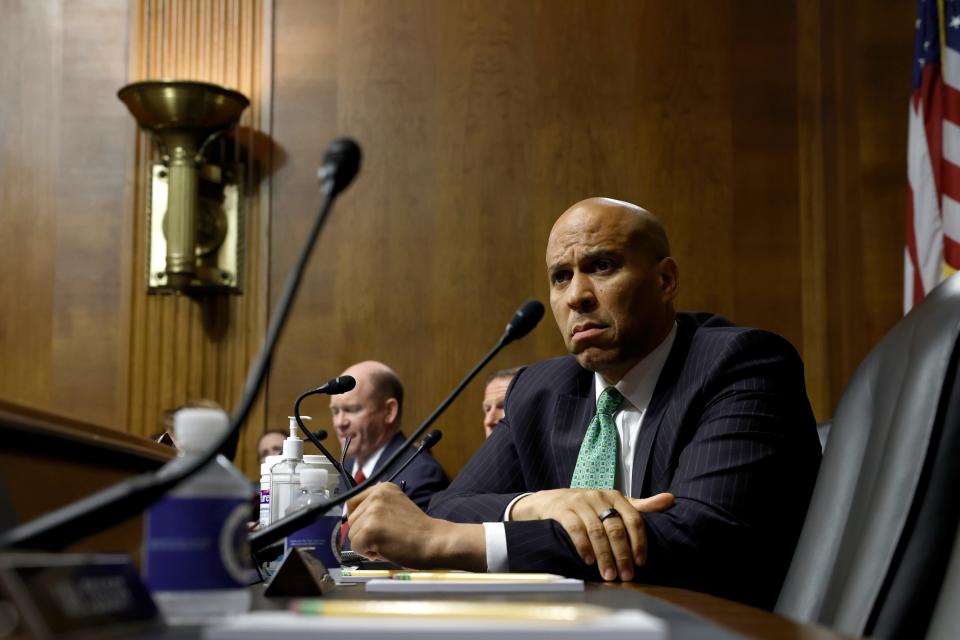In shadow of mass shootings, lawmakers, advocates press senators at hearing for gun violence response
- Oops!Something went wrong.Please try again later.
WASHINGTON – Health and law experts, law enforcement, and a parent of a school shooting victim spoke in a Senate Judiciary Committee hearing Wednesday in favor of new gun violence legislation – but also said a bipartisan deal being negotiated in Congress doesn’t go far enough.
But many pro-gun Republican lawmakers said they won’t back the "framework" being discussed until they see what the actual bill says despite the support in principle from Senate Minority Leader Mitch McConnell, R-Ky.
As details for the framework continue to be ironed out, Wednesday's hearing offered a better sense of what stakeholders and senators hope to see added beyond the broad proposal – and the reservations they have.
“This framework doesn’t include everything I want, but it’s made up of reforms that Americans overwhelmingly support,” said Illinois Democratic Sen. Dick Durbin who chairs the committee.
Broad support for mental health, early intervention, community support
The bipartisan framework deal includes support for state crisis intervention, investment in children and family mental health services and penalties for straw purchasing. It also includes protections for domestic violence victims, clarification on the definition of a federally licensed firearms dealer and funding for school safety resources and school-based mental health services.
An "enhanced review process" for gun buyers under 21 years of age would include investigative period to review juvenile and mental health records, including checks with state databases and local law enforcement.
It would not ban assault-style weapons, prohibit high-capacity magazines, or raise the age from 18 to 21 to buy a semi-automatic rifle.
In Wednesday's hearing, senators disagreed on how much legislation should revolve around mental health services versus stricter gun control. Mora Szilagyi, a pediatrician and president of the American Academy of Pediatrics, said it will take “a multipronged approach,” as an issue as complex and pervasive as gun violence doesn’t have simple solutions.
Szylagi cited a recent study that found all school shooters have significant childhood trauma. Addressing those issues early on with a network of school-based, community-based, and primary care-based centers would help identify signs of trouble before a situation worsens.
Several senators and witnesses touted red flag laws, which allow courts to confiscate firearms from those deemed a danger to themselves or others. Sen. Richard Blumenthal, D-Conn., spoke in favor of expanding these, extreme risk protection orders which he and Sen. Lindsey Graham, R-S.C., have introduced in the bipartisan framework.

Another feature of the proposal being negotiated would close the "boyfriend loophole" in purchasing firearms is another initiative already in the bipartisan framework has the support of Sen. Amy Klobuchar, D-Minn., a member of the committee.
Federal laws only prevent formerly or currently married partners, partners who live together, or partners who have a child from buying a gun if convicted of domestic violence. The restriction does not apply to people who commit the abuse while dating – but not living with – the victim.
More: What is the 'boyfriend loophole' in the bipartisan gun deal announced by senators?
Klobuchar said in the hearing that half of the 600 women every year shot by intimate partners are only dating and don’t fit into the law.
Szilagy agreed closing the loophole would not only reduce intimate partner homicides, but also prevent more childhood trauma from youth injured or killed in domestic crossfire or who witness domestic abuse.
Witnesses and senators advocate for more new details to framework
Max Schachter, whose son Alex was killed during the mass shooting at Marjory Douglas Stoneman High School in 2018, advocated for a federal clearinghouse meant to be a one-stop website for information, resources, and grants for schools on how to improve school preparedness.
The website, schoolsafety.gov, brings together resources from the Department of Education, Department of Justice, and Department of Homeland Services along with a grant finder with 40 different programs and $2 billion worth of grants available for initiatives like mental health, threat assessment, emergency planning, and cyberbullying.
The bill would require the Secretary of Education to notify school districts across the country about those resources. Sen. Ron Johnson (R-WI) brought the bill to the floor on May 25, one day after the Uvalde, Texas, school shooting, but Senate Majority Leader Chuck Schumer, D-N.Y., blocked the bill saying it didn't adequately address the issue of gun violence.
GOP Sen. Johnson just tried for a bill that could see more guns in schools—I blocked it.
The truth: There were officers at the school in Texas. The shooter got past them.
We need real solutions—We will vote on gun legislation starting with the Domestic Terrorism Prevention Act.— Chuck Schumer (@SenSchumer) May 25, 2022
Phoenix Police Chief Jeri Williams, president of the Major Cities Chiefs Association, said the organization adopted a firearms policy in 2018 that goes further than the bipartisan framework.
Besides closing the boyfriend loophole and aggressively prosecuting third-party or "straw" purchases of guns (both proposed in the bipartisan framework), the chiefs' policy also requires universal background checks and bans assault weapons and high capacity magazines.
In the hearing, Sen. Dianne Feinstein (D-CA) voiced her support for banning assault weapons for those under 21. President Joe Biden has called for the reinstatement of the assault weapons ban which expired in 2004.

Senators and witnesses at Wednesday's hearing also pushed for the inclusion of safe storage of firearms – also known as Ethan’s Law – that would require an unloaded or loaded gun to be properly stored so children cannot access them. The proposal is not part of the bipartisan framework.
Williams told the committee that Ethan’s law “could save thousands of lives” and that the MCCA agrees that safe storage is vital for preventing accidental violence and suicide among children.
Sen. Cory Booker, D-N.J., also spoke in the hearing about the Break the Cycle of Violence Act, which would provide federal grants to communities for violence intervention and prevention programs. Booker cited the success of similar programs in Massachusetts and Oakland, California.
This article originally appeared on USA TODAY: Stakeholders press for gun violence response in Senate Judiciary hearing

